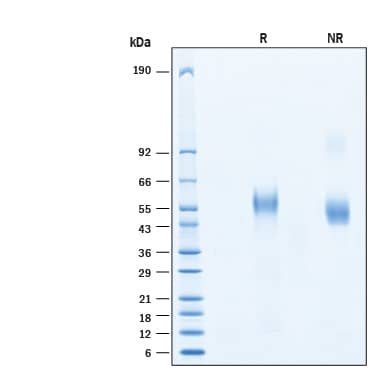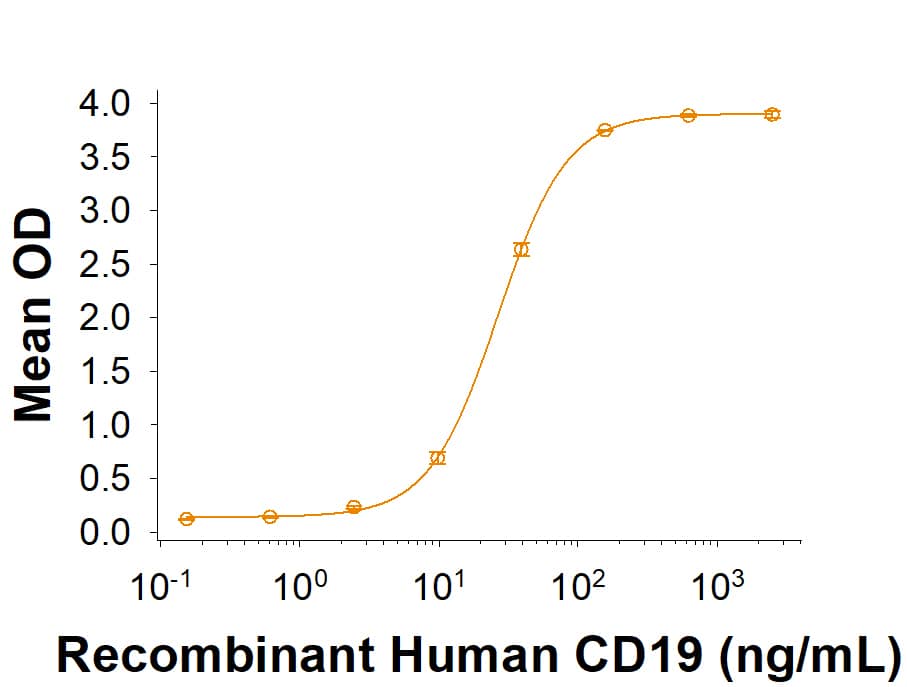Recombinant Human CD19 His-tag Protein, CF
R&D Systems, part of Bio-Techne | Catalog # 11095-CD

Key Product Details
Product Specifications
Source
Chinese Hamster Ovary cell line, CHO-derived human CD19 protein
| Human CD19 (Glu21-Lys291) Accession # P15391.6 |
6-His tag | IEGR |
| N-terminus | C-terminus |
Purity
>95%, by SDS-PAGE visualized with Silver Staining and quantitative densitometry by Coomassie® Blue Staining.
Endotoxin Level
<0.10 EU per 1 μg of the protein by the LAL method.
N-terminal Sequence Analysis
Glu21
Predicted Molecular Mass
31 kDa
SDS-PAGE
50-65 kDa, under reducing conditions.
Activity
Measured by its binding ability in a functional ELISA.
When Human CD19 Antibody (FMC63) (Novus Biologicals, Catalog # NBP2-52716) is immobilized at 2.00 µg/mL (100 µL/well), Recombinant Human CD19 binds with an ED50 of 15.0-150 ng/mL.
When Human CD19 Antibody (FMC63) (Novus Biologicals, Catalog # NBP2-52716) is immobilized at 2.00 µg/mL (100 µL/well), Recombinant Human CD19 binds with an ED50 of 15.0-150 ng/mL.
Scientific Data Images for Recombinant Human CD19 His-tag Protein, CF
Recombinant Human CD19 His-tag Protein Binding Activity.
When Human CD19 Antibody (FMC63) (Novus Biologicals, Catalog # NBP2-52716) is immobilized at 2.00 µg/mL (100 µL/well), Recombinant Human CD19 His-tag Protein (Catalog # 11095-CD) binds with an ED50 of 15.0-50 ng/mL.Recombinant Human CD19 His-tag Protein SDS-PAGE.
2 μg/lane of Recombinant Human CD19 His-tag Protein (Catalog # 11095-CD) was resolved with SDS-PAGE under reducing (R) and non-reducing (NR) conditions and visualized by Coomassie® Blue staining, showing bands at 50-65 kDa.Formulation, Preparation and Storage
11095-CD
| Formulation | Lyophilized from a 0.2 μm filtered solution in PBS with Trehalose. |
| Reconstitution | Reconstitute at 500 μg/mL in PBS. |
| Shipping | The product is shipped at ambient temperature. Upon receipt, store it immediately at the temperature recommended below. |
| Stability & Storage | Use a manual defrost freezer and avoid repeated freeze-thaw cycles.
|
Background: CD19
References
- Wang, K. et al. (2012) Exp. Hematol. Oncol. 1:36.
- Del Nargo, C.J. et al. (2005) Immunol Res. 31:229.
- Yu, F. et al. (2010) J Neurooncol. 103:187.
- Kochenderfer, J. et al. (2015) J. Clin. Oncol. 33:540.
- Lee, D. et al. (2015) Lancet. 385:517.
- Ahmad, A. et al. (2020) Int. J. Mol. Sci. 21:3906.
Alternate Names
CD19, CVID3, Leu-12
Entrez Gene IDs
Gene Symbol
CD19
UniProt
Additional CD19 Products
Product Documents for Recombinant Human CD19 His-tag Protein, CF
Product Specific Notices for Recombinant Human CD19 His-tag Protein, CF
For research use only
